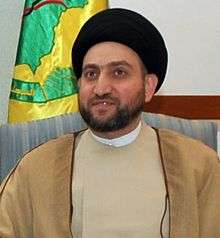Ammar al-Hakim
Sayyid Ammar al-Hakim (Arabic: سید عمار الحكيم) is an Iraqi cleric and politician who led the Islamic Supreme Council of Iraq,[2] from 2009 to 2017.
Ammar al-Hakim | |
|---|---|
سید عمار الحكيم | |
 | |
| President of the Islamic Supreme Council of Iraq | |
| In office 1 September 2009[1] – 1 August 2017 | |
| Preceded by | Abdul Aziz al-Hakim |
| Succeeded by | Humam Hamoudi |
| Personal details | |
| Born | 1971 (age 48–49) Najaf, Iraq |
| Nationality | Iraqi |
| Political party | National Wisdom Movement (since 2017) Islamic Supreme Council of Iraq (until 2017) |
| Relations | Hakim family |
| Residence | Najaf, Iraq |
| Alma mater | University of Qom |
| Profession | Cleric |
Early life
Al-Hakim was born in 1971 in Al-Najaf, the son of Abdul Aziz Al-Hakim, who preceded him as leader of ISCI, and the grandson of Muhsin al-Hakim, who led the Iraqi Marja' from 1961. He is a member of the Hakim family of clerics.
Exile
He went into exile in Iran in 1979 with his father after the government of Saddam Hussein had executed seven of his uncles and sixty two of his relatives. He attended private schools in Tehran and graduated from the Islamic Arabic University in Qom. He taught Arabic language, Islamic jurisprudence, logic, philosophy and the science of the Qur'an at the same university for several years.
Career
He supervises the establishment and management of many organizations, Scientific and Cultural Institution in the exile, including the House of Wisdom for Islamic Science. In 2003 he established the Al-Hakim Foundation under the supervision of his uncle Ayatollah Sayyid Muhammad Baqir Al-Hakim. The Al-Hakim Foundation later received consultative status with the Economic and Social Council of the United Nations. Headquartered in Najaf, it is now the largest institution of civil society in Iraq, with over 80 offices in all Governorates of Iraq, and working in the field of humanitarian assistance, development, human rights, and dialogue between religions. The Foundation also oversees several schools, colleges and cultural and scientific centers. The foundation holds numerous symposiums, conferences and social and cultural events, in addition to publishing a number of magazines and specialized publications.
Detainment
On February 23, 2007, he was detained by U.S. forces at a border when he was returning from Iran for 12 hours and he was released. The U.S. ambassador Zalmay Khalilzad apologized for the arrest and stressed that Washington did not mean any disrespect to al-Hakim or his family.[3]
Islamic Supreme Council of Iraq
He succeeded to the leadership of the Islamic Supreme Council of Iraq (ISCI), a leading Shiite Arab party, on the death of his father, Abdul Aziz al-Hakim, in 2009. He led the ISCI-led coalition, Citizen Alliance, in the 2014 general elections, gaining 29 seats and becoming the third largest coalition. They joined the government of Haider al-Abadi, with senior ISCI member Adil Abdul-Mahdi becoming oil minister.[2]
In August 2017, in advance of the upcoming 2018 general elections, he announced his resignation from ISCI and the creation of a new coalition called the National Wisdom Movement (Al-Hikma). All except 5 of the existing MPs from the Citizens Alliance joined Al-Hikma.[4]
References
- شورای مرکزی مجلس اعلای اسلامی عراق امروز، سید عمار حکیم را به عنوان جانشین مرحوم سید عبدالعزیز حکیم انتخاب کرد.
- "Hakim-led Citizen Coalition could shake up Iraqi elections - Al-Monitor: the Pulse of the Middle East". al-monitor.com. Retrieved 2014-07-25.
- "The New York Times". nytimes.com. Retrieved 2014-07-25.
- "Ammar al-Hakim announces the break with the legacy of the Supreme Islamic Council". Asharq al-Awsat. 2017-07-26. Retrieved 2018-01-02.
| Party political offices | ||
|---|---|---|
| Preceded by Abdul Aziz al-Hakim |
Leader of Islamic Supreme Council of Iraq 2009–2017 |
Succeeded by Humam Hamoudi |